 Advancements in technology tend to make mechanical and other operations better, and sometimes, that means breaking down a certain concept and addressing it more simply. For example, in the realm of electrical thermal management, the goal was traditionally to overwhelm electrical waste heat with colder chilled air. Solutions such as air conditioners and air compressors accomplished this with reliable success, but at high energy and maintenance costs. Instead of making it more efficient to chill air, ambient heat exchangers have advanced electrical thermal management by tackling waste heat in a much simpler way – by transferring the waste heat to an area where it can do no harm. (more…)
Advancements in technology tend to make mechanical and other operations better, and sometimes, that means breaking down a certain concept and addressing it more simply. For example, in the realm of electrical thermal management, the goal was traditionally to overwhelm electrical waste heat with colder chilled air. Solutions such as air conditioners and air compressors accomplished this with reliable success, but at high energy and maintenance costs. Instead of making it more efficient to chill air, ambient heat exchangers have advanced electrical thermal management by tackling waste heat in a much simpler way – by transferring the waste heat to an area where it can do no harm. (more…)
Can Heat Exchangers Be Used for Wastewater Treatment?
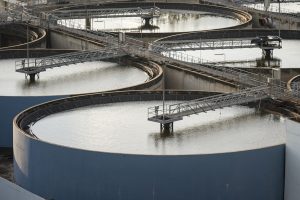 One of the most beneficial aspects of modern heat exchangers is that they can be designed for attached to a wide variety of electrical enclosures. Their ability to transfer waste heat without needing large amounts of energy and without taking up large swaths of space make them versatile enough to fit most applications. However, since they were first introduced, heat exchangers have also been used for several different types of applications outside of cooling electrical enclosures. For example, in addition to cooling electrical apparatus, heat exchangers can be used to direct waste heat toward processes that can make use of it, such as wastewater treatment. (more…)
One of the most beneficial aspects of modern heat exchangers is that they can be designed for attached to a wide variety of electrical enclosures. Their ability to transfer waste heat without needing large amounts of energy and without taking up large swaths of space make them versatile enough to fit most applications. However, since they were first introduced, heat exchangers have also been used for several different types of applications outside of cooling electrical enclosures. For example, in addition to cooling electrical apparatus, heat exchangers can be used to direct waste heat toward processes that can make use of it, such as wastewater treatment. (more…)
What Thermal Pins Do for the Molding Industry
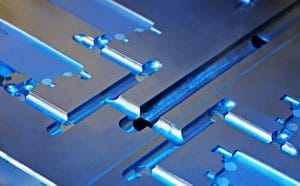 In the molding industry, thermal management is about much more than just cooling electrical equipment and technology – it’s also the foundation of the entire production process. The speed at which companies can remove heat from their molds determines their rate of output. The efficiency and precision of that heat removal largely determines the quality of each finished mold. To optimize speed, efficiency, and precision, many companies turn to specialized heat exchangers known as thermal pins, which are designed to fit most injection and extrusion molding equipment. (more…)
In the molding industry, thermal management is about much more than just cooling electrical equipment and technology – it’s also the foundation of the entire production process. The speed at which companies can remove heat from their molds determines their rate of output. The efficiency and precision of that heat removal largely determines the quality of each finished mold. To optimize speed, efficiency, and precision, many companies turn to specialized heat exchangers known as thermal pins, which are designed to fit most injection and extrusion molding equipment. (more…)
Why Tech Designs Often Include Heat Exchangers
 As heat exchangers became more popular over the last several decades, they’ve been implemented into different forms of technology throughout nearly every industry. Their efficient designs and heat transfer methods have made the thermal management solutions easily adaptable to most applications’ needs. However, many advanced technologies have also sprung up with heat exchangers as part of their initial designs. Every technological application requires an effective thermal management option, and though designers haven’t always taken those needs into consideration at first, heat exchangers have made it much easier for them to do so. (more…)
As heat exchangers became more popular over the last several decades, they’ve been implemented into different forms of technology throughout nearly every industry. Their efficient designs and heat transfer methods have made the thermal management solutions easily adaptable to most applications’ needs. However, many advanced technologies have also sprung up with heat exchangers as part of their initial designs. Every technological application requires an effective thermal management option, and though designers haven’t always taken those needs into consideration at first, heat exchangers have made it much easier for them to do so. (more…)
What Heat Exchangers Do Better than Other Solutions
 Heat exchangers have become essential to a wide variety of applications in nearly every industry imaginable. That’s because, in most applications, they accomplish most thermal management processes better than other, more traditional solutions. While their main focus is to manage electrical waste heat effectively and efficiently, they also optimize several other aspects of a company’s operations. For example, in addition to cooling electrical equipment more reliably, heat exchangers also help companies streamline their overall energy usage and consumption, and can be designed to fit the varying needs of most modern applications. (more…)
Heat exchangers have become essential to a wide variety of applications in nearly every industry imaginable. That’s because, in most applications, they accomplish most thermal management processes better than other, more traditional solutions. While their main focus is to manage electrical waste heat effectively and efficiently, they also optimize several other aspects of a company’s operations. For example, in addition to cooling electrical equipment more reliably, heat exchangers also help companies streamline their overall energy usage and consumption, and can be designed to fit the varying needs of most modern applications. (more…)
Transferring Heat in the Oil and Gas Industry
 Oil and gas production is a notoriously hazardous process, and the technology that companies use to facilitate it has to meet highly strict and specific standards. For that reason, innovative technologies such as heat exchangers have to be designed to operate safely and efficiently under the most demanding conditions. Specialized, NEMA-certified thermal management solutions can achieve these goals while also ensuring that companies save on the costs associated with their operations. When effectiveness and efficiency are as important as safety, heat exchangers can often provide the most beneficial solution. (more…)
Oil and gas production is a notoriously hazardous process, and the technology that companies use to facilitate it has to meet highly strict and specific standards. For that reason, innovative technologies such as heat exchangers have to be designed to operate safely and efficiently under the most demanding conditions. Specialized, NEMA-certified thermal management solutions can achieve these goals while also ensuring that companies save on the costs associated with their operations. When effectiveness and efficiency are as important as safety, heat exchangers can often provide the most beneficial solution. (more…)
The Value of Low-Maintenance Thermal Management
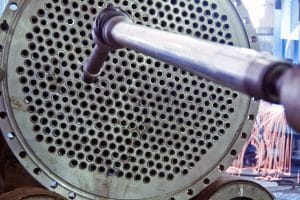 Of the many different benefits that heat exchangers provide, the direct costs such as energy expenditures are usually the most prominent savings. However, by reinventing the way companies approach electrical thermal management, heat exchangers also provide a number of important but sometimes less obvious advantages. For example, in addition to using up less energy than traditional solutions, heat exchangers also run continuously for years while needing significantly less maintenance. Over time, the savings accrued in the form of employee time and resources make the low-maintenance operations of heat exchangers increasingly more valuable. (more…)
Of the many different benefits that heat exchangers provide, the direct costs such as energy expenditures are usually the most prominent savings. However, by reinventing the way companies approach electrical thermal management, heat exchangers also provide a number of important but sometimes less obvious advantages. For example, in addition to using up less energy than traditional solutions, heat exchangers also run continuously for years while needing significantly less maintenance. Over time, the savings accrued in the form of employee time and resources make the low-maintenance operations of heat exchangers increasingly more valuable. (more…)
Questions About Heat Exchangers and Thermal Management
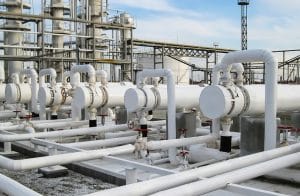 Electrical thermal management has undergone several evolutions throughout its history, but heat exchangers are one of the most impactful innovations. While the electrical cooling solutions are well-known for their simpler and more efficient heat transfer processes, they can also manage large amounts of heat with optimal efficiency. This means they not only save companies money on thermal management costs, but also significantly improve the efficiency and effectiveness of the technologies that they keep cool. (more…)
Electrical thermal management has undergone several evolutions throughout its history, but heat exchangers are one of the most impactful innovations. While the electrical cooling solutions are well-known for their simpler and more efficient heat transfer processes, they can also manage large amounts of heat with optimal efficiency. This means they not only save companies money on thermal management costs, but also significantly improve the efficiency and effectiveness of the technologies that they keep cool. (more…)
How to Use Heat Exchangers to Improve Eco-Friendliness
 The term, eco-friendly, encompasses a wide variety of efforts designed to minimize the impacts that modern-day technologies and industries have on the environment. Those impacts come in all shapes and sizes, and they can have serious consequences for much more than just specific companies. Therefore, companies have a wide range of opportunities for making sure their operations don’t negatively impact their environments and communities, or the health of the consumers they serve. In many cases, those opportunities are met squarely and effectively with the help of modern heat exchangers. (more…)
The term, eco-friendly, encompasses a wide variety of efforts designed to minimize the impacts that modern-day technologies and industries have on the environment. Those impacts come in all shapes and sizes, and they can have serious consequences for much more than just specific companies. Therefore, companies have a wide range of opportunities for making sure their operations don’t negatively impact their environments and communities, or the health of the consumers they serve. In many cases, those opportunities are met squarely and effectively with the help of modern heat exchangers. (more…)
Why Simple Heat Transfer Can Be Revolutionary
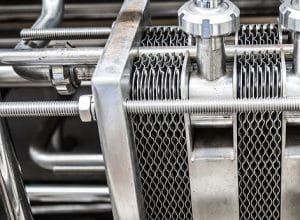 When it comes to technological revolution, simple is often the more advanced solution. For example, when it comes to electrical thermal management, the more complex methods employed by air conditioners and air compressors cost companies significantly to run. The evolution of electrical thermal management came in the form of simpler, more manageable, and more efficient processes, such as those employed by modern heat exchangers. By simplifying the process, heat exchangers helped revolutionize the way companies cool their technologies, as well as the different ways in which they can implement new technologies with minimal interruption to their operations. (more…)
When it comes to technological revolution, simple is often the more advanced solution. For example, when it comes to electrical thermal management, the more complex methods employed by air conditioners and air compressors cost companies significantly to run. The evolution of electrical thermal management came in the form of simpler, more manageable, and more efficient processes, such as those employed by modern heat exchangers. By simplifying the process, heat exchangers helped revolutionize the way companies cool their technologies, as well as the different ways in which they can implement new technologies with minimal interruption to their operations. (more…)







